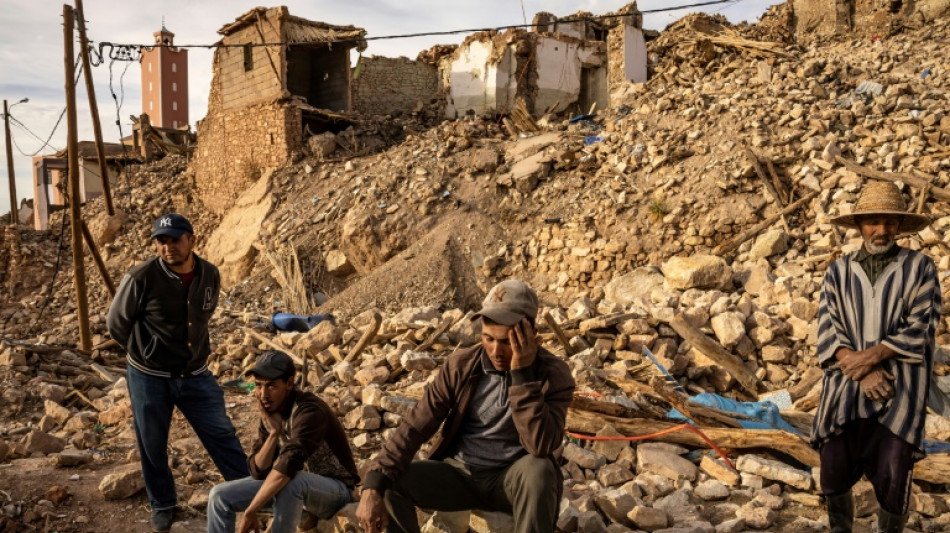
-
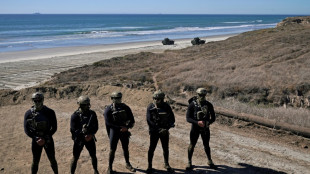 US Navy veterans battle PTSD with psychedelics
US Navy veterans battle PTSD with psychedelics
-
'Unheard of': Dodgers in awe of iron man Yamamoto

-
 UK police probe mass train stabbing that wounded 10
UK police probe mass train stabbing that wounded 10
-
'It's hard' - Jays manager Schneider rues missed chances in World Series defeat

-
 Women's cricket set for new champion as India, South Africa clash
Women's cricket set for new champion as India, South Africa clash
-
Messi scores but Miami lose as Nashville level MLS Cup playoff series

-
 Dodgers clinch back-to-back World Series as Blue Jays downed in thriller
Dodgers clinch back-to-back World Series as Blue Jays downed in thriller
-
Vietnam flood death toll rises to 35: disaster agency
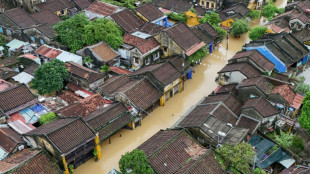
-
 History-making Japan golf twins push each other to greater heights
History-making Japan golf twins push each other to greater heights
-
Death becomes a growing business in ageing, lonely South Korea
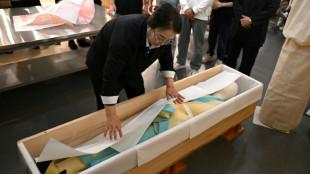
-
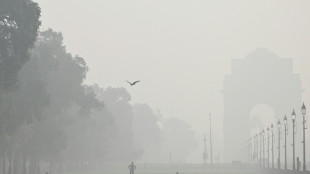 India's cloud seeding trials 'costly spectacle'
India's cloud seeding trials 'costly spectacle'
-
Chiba wins women's title, Malinin leads at Skate Canada

-
 Siakam sparks injury-hit Pacers to season's first NBA win
Siakam sparks injury-hit Pacers to season's first NBA win
-
Denmark's fabled restaurant noma sells products to amateur cooks
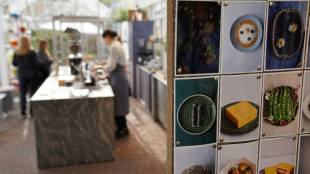
-
 UK train stabbing wounds 10, two suspects arrested
UK train stabbing wounds 10, two suspects arrested
-
Nashville top Messi's Miami 2-1 to level MLS Cup playoff series

-
 Fergie, her daughters and the corgis hit by Andrew crisis
Fergie, her daughters and the corgis hit by Andrew crisis
-
'I can't eat': Millions risk losing food aid during US shutdown

-
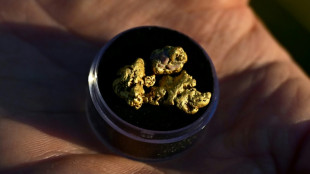 High price of gold inspires new rush in California
High price of gold inspires new rush in California
-
'Swing for the fences': Carney promises bold budget as US threat grows
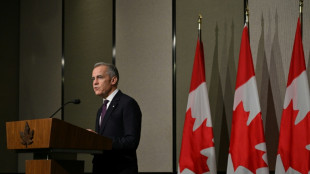
-
 UK police arrest two after 'multiple people' stabbed on train
UK police arrest two after 'multiple people' stabbed on train
-
NBA Hawks lose guard Young for four weeks with knee sprain

-
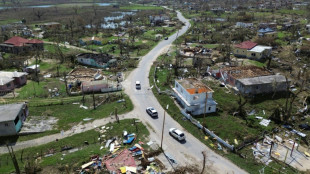 50 dead as Caribbean digs out from Hurricane Melissa
50 dead as Caribbean digs out from Hurricane Melissa
-
Forever Young gives Japan first Breeders' Cup Classic triumph

-
 Mbappe's Real Madrid extend Liga lead, Villarreal move second
Mbappe's Real Madrid extend Liga lead, Villarreal move second
-
Salah savours 'great feeling' after 250th Liverpool goal

-
 Ethical Diamond surges to upset win in $5 million Breeders' Cup Turf
Ethical Diamond surges to upset win in $5 million Breeders' Cup Turf
-
Kinghorn kicks Toulouse to Top 14 summit

-
 Mbappe extends Real Madrid's Liga lead in Valencia rout
Mbappe extends Real Madrid's Liga lead in Valencia rout
-
All Blacks sink 14-man Ireland 26-13 in Chicago Test

-
 World champ Malinin takes lead at Skate Canada
World champ Malinin takes lead at Skate Canada
-
Liverpool snap losing streak as Salah hits 250 goals in Villa win

-
 Salah's 250th Liverpool goal sinks Villa as Arsenal cruise at Burnley
Salah's 250th Liverpool goal sinks Villa as Arsenal cruise at Burnley
-
Morant suspended by Grizzlies after rebuking coaching staff

-
 Spalletti begins Juve tenure with win at Cremonese but Napoli held
Spalletti begins Juve tenure with win at Cremonese but Napoli held
-
Frank refuses to condemn Van de Ven, Spence for snub in Spurs defeat

-
 France superstar Dupont extends Toulouse deal
France superstar Dupont extends Toulouse deal
-
Egypt officially opens grand museum near pyramids
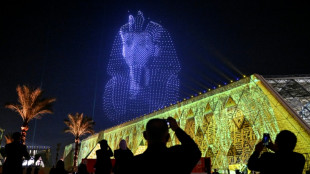
-
 French fraud watchdog reports Shein for 'childlike' sex dolls
French fraud watchdog reports Shein for 'childlike' sex dolls
-
Scotland thrash USA before All Blacks' clash

-
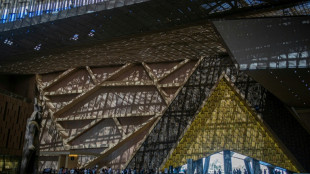 Five things to know about the Grand Egyptian Museum
Five things to know about the Grand Egyptian Museum
-
Bayern rest stars but ease past Leverkusen before PSG clash

-
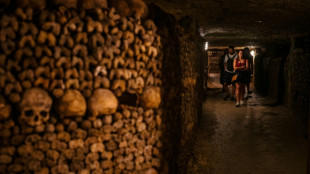 Dead quiet: Paris Catacombs close for renovations
Dead quiet: Paris Catacombs close for renovations
-
Families separated, children killed as survivors flee Sudan's 'apocalyptic' El-Fasher
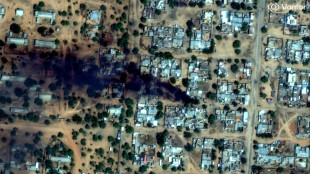
-
 Napoli held by Como as Spalletti begins Juve adventure
Napoli held by Como as Spalletti begins Juve adventure
-
Southampton boss Still vows to fight on as pressure mounts

-
 Borthwick hails 'ball of energy' Pollock as England down Australia
Borthwick hails 'ball of energy' Pollock as England down Australia
-
Egypt opens grand museum in lavish, pharaonic ceremony
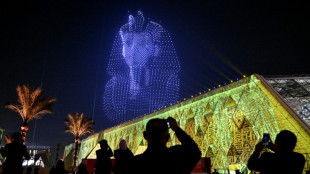
-
 Joao Pedro strikes at last as Chelsea edge past Spurs
Joao Pedro strikes at last as Chelsea edge past Spurs
-
Ohtani to open for Dodgers in World Series deciding game seven


Changed 'forever': Morocco slowly rebuilds a year after quake
For the past year Kebira Ait Bellaid has been living in a tent in a mountain village in Morocco, haunted by the memory of losing her daughter and three grandchildren.
"I can still hear my nine-year-old grandson's screams under the rubble," the 52-year-old said, recalling the September 8 earthquake that devastated the area.
"This earthquake has changed me forever," she told AFP.
The 6.8-magnitude quake killed nearly 3,000 people and damaged the homes of over two million people across the High Atlas region.
In Tiniskt, a village perched in the mountains about 70 kilometres (45 miles) southwest of Marrakesh, 45 people lost their lives.
Of the roughly 500 villagers who remain, many are still living in tents, unable to escape the trauma.
Tears welling in her eyes, Khadija Id Yassine said she tries to forget about the quake but "it remains anchored" in her mind.
"Life has been hard in the tent, between the freezing cold of winter and the stifling heat of summer," said Yassine, a mother of three whose house is still awaiting reconstruction.
While most debris has been cleared, the village still bears signs of destruction. Only the mosque and three houses, built with concrete, remain standing.
- 'Turn this painful page' -
The government has provided most families in Tiniskt with an initial payout of 20,000 Moroccan dirhams (around $2,000). But no houses have been rebuilt.
Al Haouz province, which includes Tiniskt, was the worst affected area, with about 24,000 houses slated for reconstruction -- but only around 1,000 have been rebuilt.
Amine Bouih of Al-Omrane public construction agency said it was still tricky to access damaged areas in mountainous terrain.
Ambulance driver Brahim Ait Ouarah, from the village of Ouirgane near Tiniskt, said he paid out of his own pocket to rebuild his home, only getting state aid later.
"The six months I spent in a tent were very difficult," said Ouarah, who lost his wife and son in the quake.
"I was eager to turn this painful page, even when nothing can compensate for the lost lives."
- 'Big mistake' -
Locals are not only frustrated with the slow pace of rehousing, but also with how the new homes are being built.
Concrete is being widely used in Tiniskt and other villages, rather than traditional building materials like clay and stone.
Architect Khalil Morad El Gilali thinks this is "a big mistake".
"It is expensive, not suitable for this environment and not reliable," he said.
Gilali has been involved in the reconstruction of 70 houses using the traditional clay and stone of the villages, turning down projects that use concrete.
He argues that the authorities, in their rush to rebuild, have shown "a lack of vision".
But Al Omrane's Bouih said traditional architecture takes more time -- a luxury in short supply when people desperately need shelter.
A.Ruegg--VB




